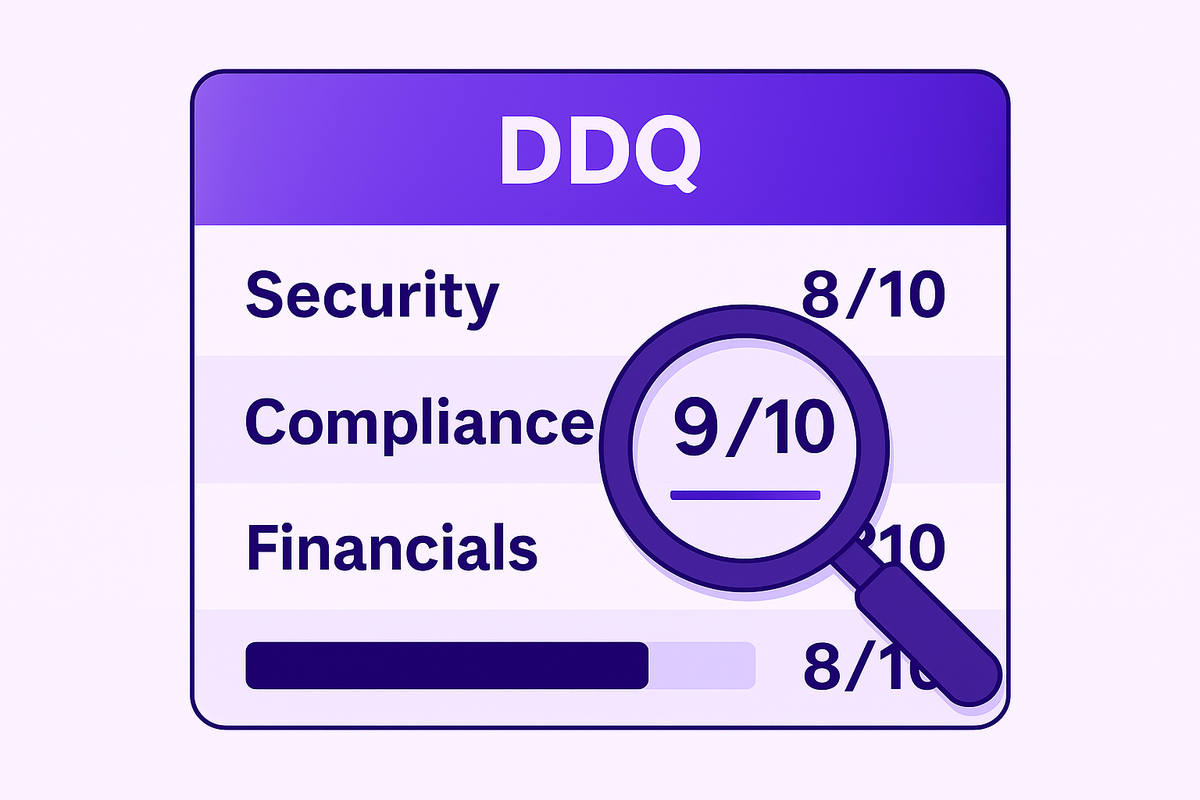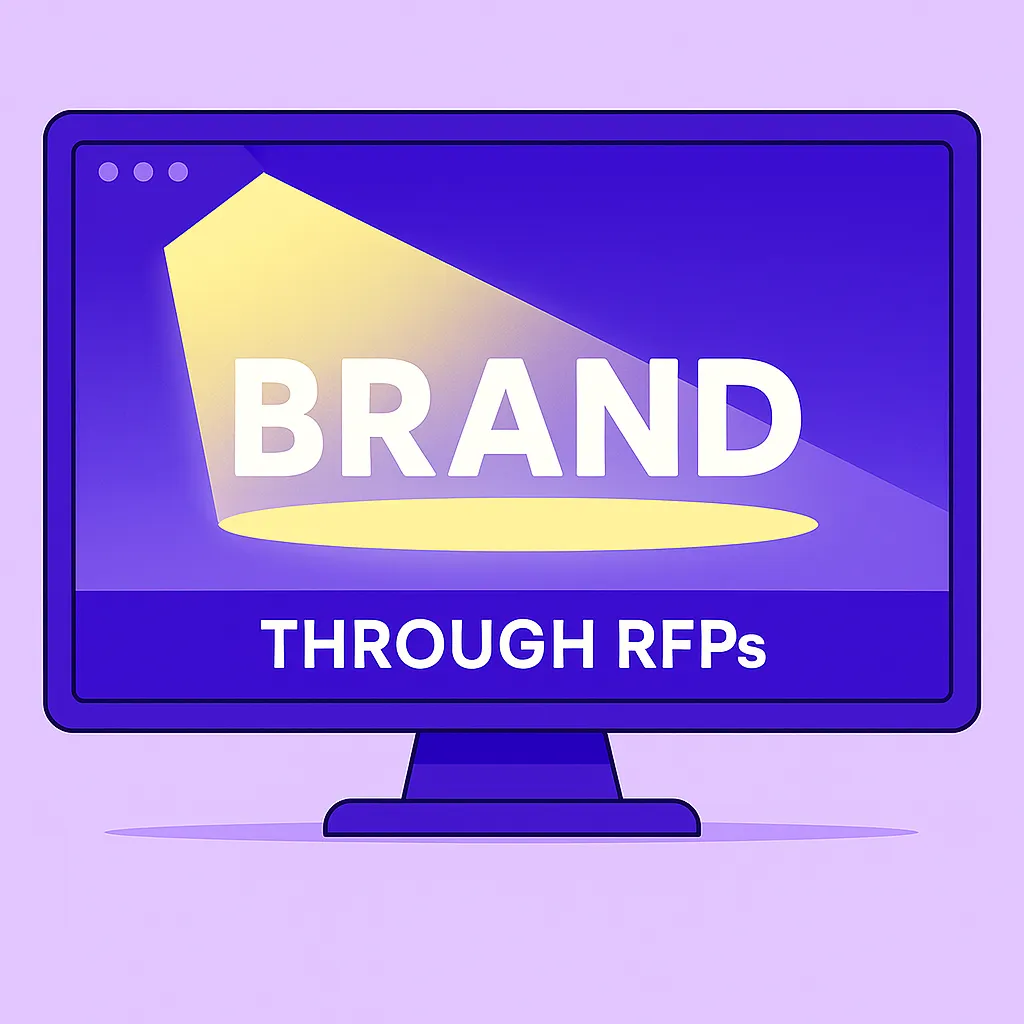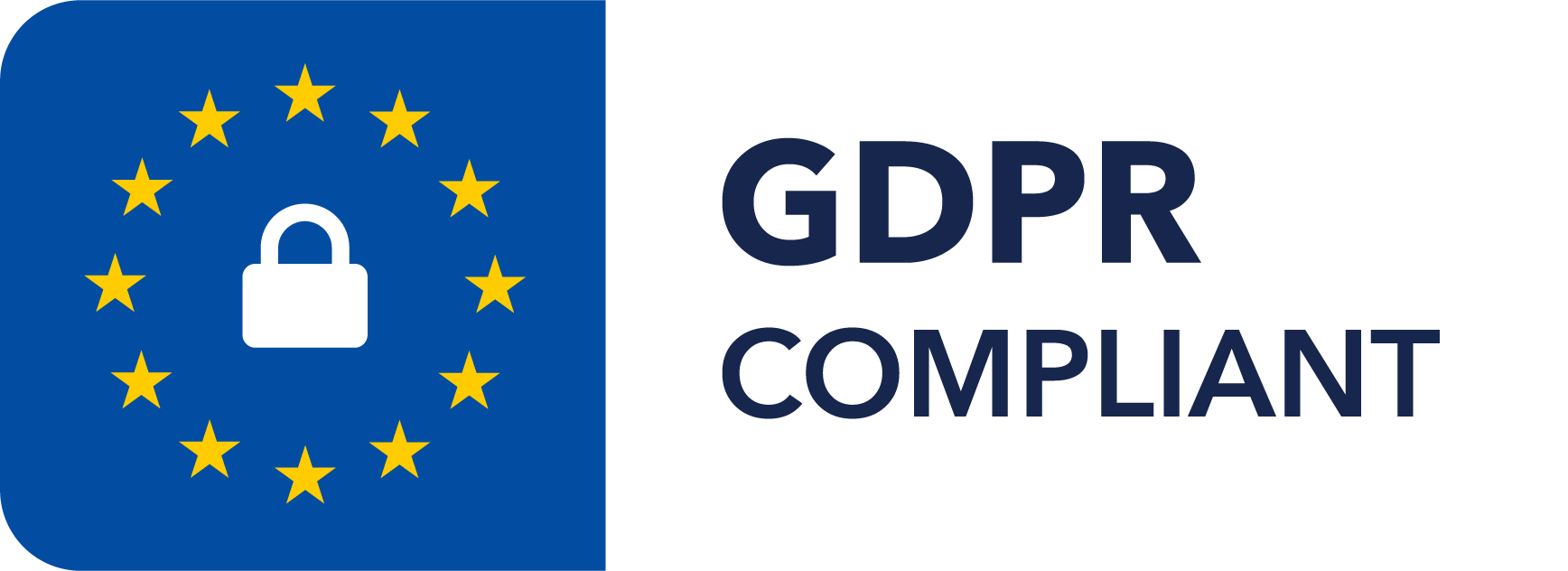DDQs: Your Guide to Effective Third-Party Risk Management
August 4, 2025
By
Evie Secilmis

Receiving a Due Diligence Questionnaire can feel like getting a mountain of homework right before closing a deal. But instead of seeing it as a chore, you can view it as a strategic opportunity. A well-prepared response to a DDQ is your chance to showcase your company’s strengths, from financial stability to robust security protocols. It builds confidence and sets you apart from competitors who might stumble through the process. This article will show you how to approach DDQs with a plan, covering the key areas they examine and how to prepare answers that win trust and accelerate your sales cycle.
Why Your Data Management Needs DDQS
In the realm of data management, the term "DDQS" might not be immediately familiar to everyone. However, understanding and implementing DDQS can be a game-changer for organizations that rely on data to drive decision-making and strategy.
DDQS, which stands for Due Diligence Questionnaires, is a crucial component in the procurement and vendor management process, particularly when dealing with Requests for Proposals (RFPs). In this article, we'll explore the significance of DDQS, how they fit into the broader data management landscape, and why they are essential for any organization aiming to make informed, data-driven decisions.
The Growing Importance of Third-Party Risk Management
If you're on a sales team, you've probably noticed a trend: proposals are getting packed with more questions about your company's security, compliance, and operational stability. This isn't just about ticking boxes; it reflects a major shift in how businesses approach partnerships. As companies become more interconnected, they also share more risk. Your potential customers aren't just evaluating your product—they're vetting your entire organization as a partner and assessing the potential risks you might introduce into their ecosystem. This is the heart of third-party risk management, and it’s why detailed documents like DDQs are now a standard part of doing business.
Understanding the Scale of Third-Party Risk
It's easy to see why companies are so cautious. Most businesses depend on a complex network of vendors to operate, and every new partnership introduces potential vulnerabilities. The numbers back this up—some reports show that around 60% of security problems actually originate from third-party vendors. This is precisely why Due Diligence Questionnaires (DDQs) have become so critical. They act as a company's first line of defense, helping them spot red flags before a contract is signed. Across industries like finance and tech, organizations rely on DDQs to confirm that a new relationship aligns with their goals and meets all necessary legal and compliance standards, making it a fundamental step in their procurement process.
What is DDQS?
DDQS, or Due Diligence Questionnaires, are structured sets of questions used to gather information about potential vendors or partners. They are designed to assess the capabilities, reliability, and compliance of these entities before entering into any formal agreements. The goal of DDQS is to ensure that the organization selects partners that align with its standards and objectives.
A Critical First Step in Due Diligence
Think of a DDQ as the essential homework you do before making a major business commitment. It’s a key part of a larger process called "due diligence," which, as the team at Responsive puts it, means "carefully checking all the facts before agreeing to a deal." This isn't just about ticking boxes; it's a deep dive to uncover potential risks and verify that a potential partner is who they say they are. For your sales team, responding to a DDQ is your chance to build trust and prove your company’s stability and reliability from the very beginning. It lays the foundation for a transparent and successful partnership by getting all the critical information out on the table.
The Importance of Customization
A DDQ is far more than a generic checklist. It’s a strategic tool that protects businesses from unforeseen issues. As the experts at Skypher note, it helps you avoid "flying blind" in business by tailoring questions to specific situations. A DDQ for a tech startup will look very different from one for a financial institution. This customization is crucial because it ensures the questions are relevant and uncover the most pertinent information for that specific deal or industry. For your team, this means you can't rely on boilerplate answers. Each response needs to be thoughtful and directly address the unique concerns of the potential partner, which can be a time-consuming process without the right tools in place.
What's Inside a Due Diligence Questionnaire?
When you first open a DDQ, it can feel a bit overwhelming. These documents are designed to be thorough, covering nearly every aspect of your business to give a potential partner a complete 360-degree view of your organization. They dig into your finances, daily operations, legal standing, and even your company's reputation. While the exact questions will vary, they generally fall into several core categories. Understanding these key areas will help your team prepare and gather the necessary information ahead of time, making the response process much smoother. Let's break down the most common sections you'll encounter.
Financial Health
This section is all about the numbers. Potential partners want to see that your company is on solid financial ground before they sign a contract. A DDQ will ask for details about your company's monetary situation, including revenue, existing debts, and overall financial performance. You’ll likely be asked to provide financial statements, projections, and information about your funding history. This isn't just about proving profitability; it's about demonstrating stability and long-term viability. A potential partner is assessing the risk of doing business with you, and strong financial health is a clear indicator that you’re a reliable and secure choice for the long haul.
Business Operations
Beyond the balance sheet, a DDQ dives into how your company actually works day-to-day. This section examines your operational structure, from your management team and employee policies to the efficiency of your internal processes. Questions might cover your organizational chart, the experience of your key personnel, your supply chain management, and your quality control procedures. This is your opportunity to showcase the well-oiled machine behind your products or services. A clear and efficient operational model shows that your company is not only capable of delivering on its promises but can also scale and adapt to future demands.
Regulatory and Legal Compliance
This is where you prove that your business operates by the book. The compliance section of a DDQ verifies that your company adheres to all relevant laws and industry regulations. It also checks for any past, present, or potential legal issues, such as lawsuits or disputes. You'll need to provide information on licenses, certifications, and your internal policies for data privacy and security—especially if you handle sensitive customer information. For potential partners, this section is critical for risk management. It assures them that you are a responsible, low-risk partner and that they won’t face any legal troubles by associating with you.
Reputation and Ethics
In business, reputation is everything. This part of the DDQ moves beyond concrete data to assess your company's public image and ethical standing. It may ask about press coverage, customer reviews, company values, and any history of controversies or ethical complaints. Partners want to align themselves with businesses that are respected and conduct themselves with integrity. A strong, positive reputation can be a significant competitive advantage. This is your chance to highlight your company's commitment to ethical practices, corporate social responsibility, and building a brand that customers and partners are proud to be associated with.
Intellectual Property
For many companies, especially in the tech sector, intellectual property (IP) is one of the most valuable assets. This section of a DDQ focuses on details related to your IP, including patents, trademarks, copyrights, and any proprietary technology or trade secrets. You’ll need to demonstrate that you have clear ownership of your IP and have taken the necessary steps to protect it. Responding to these technical questions requires pulling precise information, which is where an AI-powered platform can be invaluable for quickly finding accurate answers. Proving you have a strong and well-protected IP portfolio assures a potential partner of your company's unique value and long-term competitive edge.
How DDQS and RFPs Work Together
When an organization issues a Request for Proposal (RFP), it is essentially seeking proposals from vendors to address a specific need or project. DDQS play a vital role in this process by providing a standardized way to evaluate the various proposals received. By systematically collecting and analyzing responses to the DDQS, organizations can make more informed choices about which vendors to engage with.
Beyond Vendor Selection: Broader Uses for DDQs
While DDQs are a staple in the vendor selection process, their utility extends far beyond just picking a new software provider. Think of them as a versatile tool for risk assessment in any major business transaction. They provide a structured framework for gathering critical information whenever you need to make a high-stakes decision. From multi-million dollar acquisitions to securing a new line of credit, DDQs are the backbone of a thorough evaluation, ensuring all parties have a clear and comprehensive understanding of what they’re getting into. This process helps uncover potential liabilities and confirms that a potential partnership is as solid as it appears on the surface.
Mergers and Acquisitions (M&A)
In the world of mergers and acquisitions, DDQs are absolutely essential. Before one company acquires another, the buyer needs to be certain it’s making a sound financial decision. A detailed DDQ acts as a deep-dive investigation into the target company's health, covering everything from financial stability and operational processes to legal standing and cybersecurity protocols. This isn't just about kicking the tires; it's a comprehensive review to ensure the due diligence process uncovers any hidden risks or deal-breaking issues. The responses help the acquiring company validate the investment and move forward with confidence.
Investment and Capital Opportunities
When venture capitalists or private equity firms consider investing in a company, they rely heavily on DDQs to vet the opportunity. These questionnaires help investors look past the pitch deck and understand the company's true potential and underlying risks. They dig into financial records, intellectual property, market position, and compliance history to build a complete picture. For the company seeking capital, providing clear and accurate responses is crucial. It’s their chance to demonstrate transparency and prove they are a trustworthy and viable investment, which can make all the difference in securing the funding they need to grow.
Lending and Financial Partnerships
Banks and other financial institutions use DDQs as a primary tool for risk assessment before issuing loans or entering into financial partnerships. When a business applies for a significant loan, the lender needs to verify its ability to repay the debt. A DDQ in this context will scrutinize the company's financial statements, cash flow, existing debts, and overall business model. It helps the bank determine if the borrower is creditworthy and if the loan aligns with the institution's risk tolerance. This systematic evaluation protects the lender's interests and ensures they only partner with financially responsible organizations.
Ongoing Partner Monitoring
The due diligence process doesn't end once a contract is signed. Smart companies use DDQs for ongoing monitoring of their key suppliers and partners. A lot can change over the course of a business relationship—a vendor’s financial stability could decline, or their security practices might become outdated. Periodically issuing a DDQ helps you monitor these relationships and ensure your partners continue to meet your standards for compliance, security, and performance. This proactive approach to vendor management helps mitigate risks before they can impact your business operations.
Standardized DDQs Across Industries
The importance of DDQs is so widely recognized that many industries have developed their own standardized templates. These industry-specific questionnaires ensure that evaluations are consistent, comprehensive, and focused on the unique risks and regulations of a particular sector. Using a standardized format saves time for both the issuer and the respondent, as the questions are predictable and tailored to relevant concerns. This approach also creates a common language for due diligence within an industry, making it easier to compare different opportunities and maintain a high standard of risk management across the board. It’s a clear sign that thorough vetting is not just a best practice but a core business function.
Investment Management (AIMA)
In the complex world of investment management, the Alternative Investment Management Association (AIMA) provides standardized DDQs that have become an industry benchmark. These questionnaires are designed to help investors thoroughly evaluate hedge funds and other alternative investments. They cover critical areas like investment strategy, risk management processes, operational infrastructure, and regulatory compliance. By using the AIMA DDQ, investors can systematically compare different funds and make more informed decisions, ensuring their capital is placed with reputable and well-managed firms.
Responsible Investing (PRI)
As environmental, social, and governance (ESG) factors become more important to investors, organizations like the Principles for Responsible Investment (PRI) have developed specialized DDQs. These questionnaires help asset owners assess how well investment managers integrate responsible investment principles into their strategies. The questions focus on topics like climate risk, labor practices, and corporate governance. The PRI DDQs enable investors to ensure their portfolios align with their values and meet growing demands for sustainable and ethical investment practices.
Banking (The Wolfsberg Group)
The banking industry faces intense regulatory scrutiny, particularly around financial crime. The Wolfsberg Group, an association of thirteen global banks, created a Correspondent Banking Due Diligence Questionnaire (CBDDQ) to address these risks. This highly detailed DDQ is the industry standard for assessing a bank's anti-money laundering (AML) and counter-terrorist financing (CTF) controls. It helps banks ensure that their correspondent partners have robust compliance programs in place, which is crucial for maintaining the integrity of the global financial system and preventing illicit activities.
Getting Your DDQS Process Right
How to Write Questionnaires That Get Results
To implement DDQS effectively, organizations must develop comprehensive questionnaires that cover all relevant aspects of vendor evaluation. This includes questions about the vendor's financial stability, technical capabilities, security protocols, and past performance. The more detailed the questionnaire, the more valuable the insights gained.
Putting Your DDQS Process on Autopilot
Automation can significantly enhance the efficiency of the DDQS process. Many organizations now use software solutions that automate the distribution, collection, and analysis of DDQS responses. Automation reduces the time and effort required to manage the process and ensures that all responses are collected in a consistent format for easy analysis.
Why Keeping Your DDQS Updated Matters
The business environment is constantly changing, and so are the compliance requirements and industry standards. Organizations must regularly review and update their DDQS to ensure they remain relevant and comprehensive. This proactive approach helps organizations stay ahead of potential risks and maintain strong vendor relationships.
Common DDQS Roadblocks (And How to Get Past Them)
Simplifying an Overly Complex Process
Developing and managing DDQS can be complex, particularly for large organizations dealing with numerous vendors. The key to overcoming this challenge is to break down the process into manageable steps and use technology to streamline operations.
How to Get Vendors to Actually Respond
Another common challenge is ensuring that vendors complete the DDQS accurately and promptly. Clear communication about the importance of the DDQS and how it benefits both parties can encourage vendor participation. Additionally, offering support throughout the process can help address any concerns vendors may have.
Keeping Your DDQS Data Safe and Secure
When handling sensitive information through DDQS, data security is paramount. Organizations must implement robust security measures to protect the data collected and ensure that it is only accessible to authorized personnel.
Making DDQS Work for You
DDQS are an indispensable tool in the data management arsenal of any organization. By providing a structured approach to vendor evaluation, they help ensure compliance, enhance decision-making, and mitigate risks. As organizations continue to rely on data to drive their strategies, the importance of DDQS in facilitating sound, data-driven decisions cannot be overstated.
Incorporating DDQS into your data management practices is a proactive step towards achieving operational excellence and building resilient vendor relationships. By understanding and leveraging the power of DDQS, your organization can navigate the complexities of vendor management with confidence and clarity.
Frequently Asked Questions
A DDQ is a Due Diligence Questionnaire used to assess vendor risk, security, and compliance. For a full primer, see our DDQ meaning & basics guide.
They standardize vendor data collection, improve comparability, and strengthen governance for audit, compliance, and analytics.
RFPs compare vendor solutions; DDQs validate risk, security, and compliance. Use both to select the best-fit, lowest-risk partner.
Review at least annually or when regulations, certifications, or your product surface area changes.
Yes—AI-driven tools automate distribution, response mapping, and validation, reducing manual effort and cycle time.
Key Takeaways
- Treat DDQs as a Strategic Opportunity: Instead of viewing them as a sales hurdle, see DDQs as your chance to build trust and showcase your company's stability. A thorough response proves you're a reliable partner and helps manage third-party risk from the start.
- Prepare a Complete Business Snapshot: A successful DDQ response requires detailed information from across your company, covering everything from financial health and operations to legal compliance and intellectual property. Organize these details ahead of time to make the process smoother.
- Standardize Your Response Process for Growth: DDQs are crucial for more than just sales—they're used in mergers, investments, and other high-stakes deals. A repeatable system with accurate, up-to-date answers allows your team to respond quickly and confidently to any opportunity.
Related Articles
Share this post
Link copied!



















